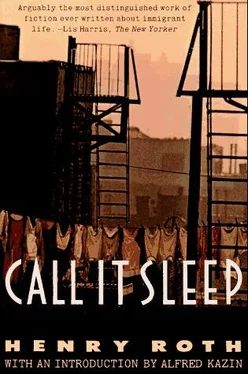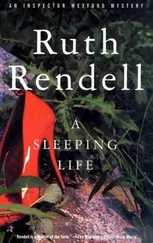“Mama!” he called out.
“What is it, my son?”
“Are you going to — to sleep inside?”
“Oh, no. Of course not! I’m just straightening my hair a little.”
“Are you coming in here soon?”
“Why yes. Is there anything you want?”
“Yes.”
“In just a moment.”
He waited impatiently for her to appear. In a little while she came out. She had changed her dress and combed her hair. She spread a frayed clean towel out on the parlor steps and sat down.
“I can’t come over unless I have to,” she smiled. “You’re on an island. What is it you want?”
“I forgot,” he said lamely.
“Oh, you’re a goose!”
“It has to dry,” he explained. “And I have to watch it.”
“And so I do too, is that it? My, what a tyrant you’ll make when you’re married!”
David really didn’t care what she thought of him just as long as she sat there. Besides, he did have something to ask her, only he couldn’t make up his mind to venture it. It might be too unpleasant. Still no matter what her answer would be, no matter what he found out, he was always safe near her.
“Mama, did you ever see anyone dead?”
“You’re very cheerful to-day!”
“Then tell me.” Now that he had launched himself on this perilous sea, he was resolved to cross it. “Tell me,” he insisted.
“Well,” she said thoughtfully, “The twins who died when I was a little girl I don’t remember. My grandmother though, she was the first I really saw and remember. I was sixteen then.”
“Why did she die?”
“I don’t know. No one seemed to know.”
“Then why did she die?”
“What a dogged questioner you are! I’m sure she had a reason. But do you want to know what I think?”
“Yes!” eagerly.
His mother took a deep breath, lifted a finger to arouse an already fervent attention. “She was very small, my grandmother, very frail and delicate. The light came through her hands like the light through a fan. What has that to do with it? Nothing. But while my grandfather was very pious, she only pretended to be — just as I pretend, may God forgive us both. Now long ago, she had a little garden before her house. It was full of sweet flowers in the summertime, and she tended it all by herself. My grandfather, stately Jew, could never understand why she should spend a whole spring morning watering the flowers and plucking off the dead leaves, and snipping here and patting there, when she had so many servants to do it for her. You would hardly believe how cheap servants were in those days — my grandfather had five of them. Yes, he would fret when he saw her working in the garden and say it was almost irreligious for a Jewess of her rank — she was rich then remember — the forests hadn’t been cut”—
“What forests?”
“I’ve told you about them — the great forests and the lumber camps. We were rich while the forests were there. But after they were cut and the lumber camps moved away, we grew poor. Do you understand? And so my grandfather would fret when he saw her go dirtying her hands in the soil like any peasant’s wife. But my grandmother would only smile at him — I can still see her bent over and smiling up at him — and say that since she had no beautiful beard like his to stroke, what harm could there be in getting a little dirt on her hands. My grandfather had a beard that turned white early; he was very proud of it. And once she told him that she was sure the good Lord would not be angry at her if she did steal a little from Esau’s heritage — the earth and the fields are Esau’s heritage — since Esau himself, she said, was stealing from Isaac on every side — she meant all the new stores that were being opened by the other gentiles in our town. What could my grandfather do? He would laugh and call her a serpent. Now wait! Wait! I’m coming to it.” She smiled at his impatience.
“As she grew older, she grew very strange. Shall I tell you what she used do? When autumn came and everything had died—”
“Died? Everything?” David interrupted her.
“Not everything, little goose. The flowers. When they died she didn’t want to leave the house. Wasn’t that strange? She stayed for days and days in her large living room — it had crystal chandeliers. You wouldn’t believe how quietly she would sit — not seeing the servants, hardly hearing what was said — and her hands folded in her lap — So. Nor could my grandfather, though he begged her to come out, ever make her. He even went to ask a great Rabbi about it — it was no use. Not till the first snow fall, did she willingly leave the house again.”
“Why?”
“Here is the answer. See if you can find it. When I came to visit her once on a day in late autumn, I found her sitting very quietly, as usual, in her large arm-chair. But when I was about to take my coat off, she said, keep it on, Genya, darling, there is mine on the chair in the corner. Will you get it for me, child?
“Well, I stood still staring at her in surprise. Her coat? I thought. Was she really of her own accord going out and in Autumn? And then for the first time I noticed that she was dressed in her prettiest Sabbath clothes — a dark, shimmering satin — very costly. I can see her yet. And on her head — she had never let them cut her hair — she had set a broad round comb with rows of pearls in it — the first present my grandfather had ever given her. It was like a pale crown. And so I fetched her coat and helped her put it on. Where are you going, grandmother? I asked. I was puzzled. In the garden, she said, in the garden. Well, an old woman must have her way, and into the garden we went. The day was very grey and full of winds, whirling, strong winds that could hold the trees down like a hand. Even us it almost blew about and it was cold. And I said to her, Grandmother, isn’t it too cold out here? Isn’t the wind too strong? No, her coat was warm, so she said. And then she said a very strange thing. Do you remember Petrush Kolonov? I wasn’t sure. A goy, she said, a clod. He worked for your grandfather many years. He had a neck like a tree once, but he grew old and crooked at last. And when he grew so old he couldn’t lift a faggot, he would sit on a stone and look at the mountains. This was my grandmother talking, you understand?”
David couldn’t quite follow these threads within threads, but nodded. “Why did he sit?” he asked, afraid that she might stop talking.
She laughed lightly. “That same question has been asked by three generations. You. Myself. My grandmother. He had been a good drudge this Petrush, a good ox. And when my grandmother asked him, Petrush, why do you sit like a keg and stare at the mountains, his only answer was, my teeth are all gone. And that’s the story my grandmother told me while we walked. You look puzzled,” she laughed again.
He was indeed, but she didn’t explain.
“And so we walked and the leaves were blowing. Shew-w-w! How they lifted, and one blew against her coat, and while the wind held it there, you know, like a finger, she lifted it off and crumbled it. And then she said suddenly, come let us turn back. And just as we were about to go in she sighed so that she shivered — deep — the way one sighs just before sleep — and she dropped the bits of leaves she was holding and she said, it is wrong being the way I am. Even a leaf grows dull and old together! Together! You understand? Oh, she was wise! And we went inside.”
His mother stopped, touched the floor to see if it was dry. Then she rose and went to the stove to push the seething beet soup from where it had been over the heat of the coals to the cooler end of the stove.
“And now the floor is dry,” she smiled, “I’m liberated.”
But David felt cheated, even resentful. “You — you haven’t told me anything!” he protested. “You haven’t even told me what happened?”
Читать дальше












